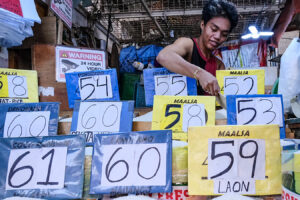DA probing firm behind overstaying containers with rice
By Kyle Aristophere T. Atienza, Reporter THE PHILIPPINES’ Department of Agriculture (DA) on Tuesday said it’s investigating one or two companies that were likely behind the overstaying of more than 800 container vans carrying rice imports at a Manila port. “In two weeks, we would know the details of the company — whether it’s existing […]

By Kyle Aristophere T. Atienza, Reporter
THE PHILIPPINES’ Department of Agriculture (DA) on Tuesday said it’s investigating one or two companies that were likely behind the overstaying of more than 800 container vans carrying rice imports at a Manila port.
“In two weeks, we would know the details of the company — whether it’s existing or not, and whether it still has offices and personnel,” Agriculture Secretary Francisco P. Tiu Laurel, Jr. told a news briefing at the presidential palace. He declined to name the company.
Authorities at the weekend said 888 container vans carrying 23,000 metric tons (MT) of imported rice — or 0.75% of the total supply that has entered the country this year — had been sitting at the Manila International Container Terminal for months.
Mr. Laurel said most of the containers were still within the 30-day staying period allowed by ports.
He cited the Philippine Ports Authority’s (PPA) statement on Monday that more than 300 containers had been claimed by their consignees.
He added the Customs bureau has deemed abandoned shipments that had been sitting at the port since 2022 and 2023.
PPA General Manager Jay Santiago on Monday said that by Oct. 1, they would send a report to the Agriculture department on the overstaying shipments and would ask Customs to declare these abandoned.
They may be auctioned or donated to other agencies such as the Social Welfare department, he added.
The Customs bureau at the weekend said only 630 containers of rice remained at the port, with 492 containers having been cleared for release. None of the shipments had exceeded the 30-day period, it added.
Mr. Santiago said it’s possible that importers were awaiting higher rice prices in the market before taking their shipments out of the port.
Market conditions were not favorable to importers because of government efforts to lower rice prices including the reduction in tariffs, he said.
It’s also cheaper for importers to store rice supply at government ports than to lease private warehouses, he said, citing instances when containers have stayed at the port for as long as 275 days.
The government aims to reduce rice prices by P5 to P7.
Philippine inflation eased to 3.3% last month from 4.4% in July, due to a moderate rise in food prices and a decline in transport costs, according to the local statistics agency.
The price increase of nonalcoholic beverages slowed to 3.9% from 6.4% in July, while transport prices declined by 0.2%.
Rice inflation slowed to 14.7% from 20.9%. Still, it remained the top contributor to August’s 3.3% inflation, which was within the government’s 2-4% target for the year.












